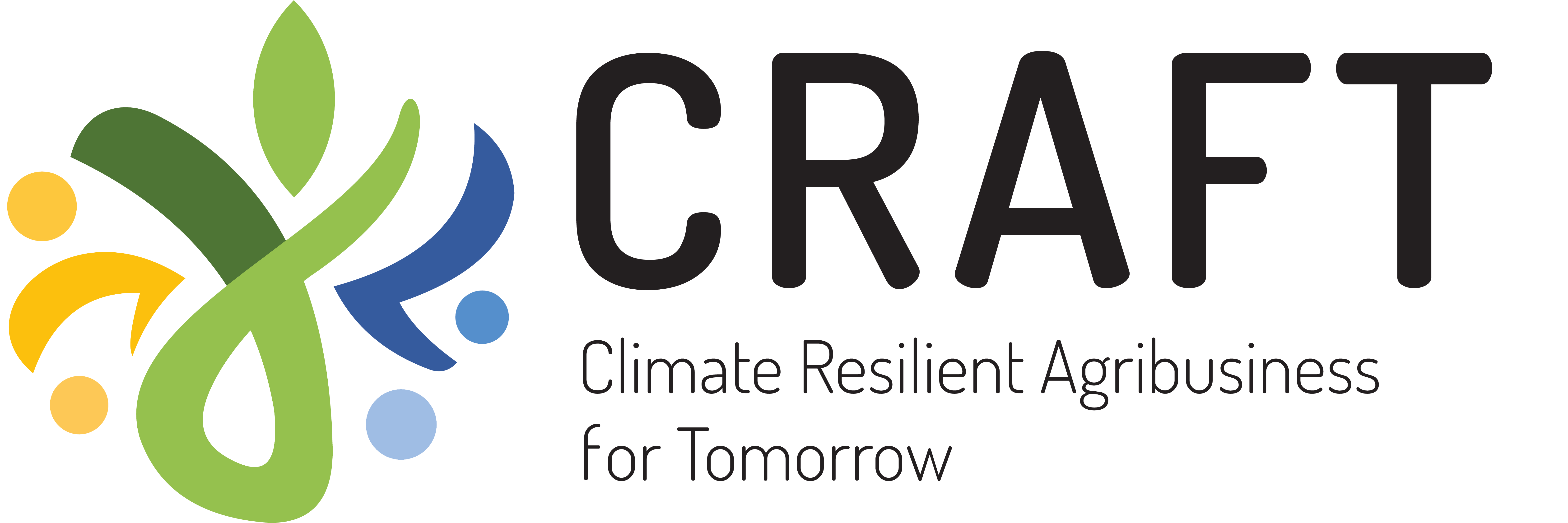About the CRAFT Project
Promoting Climate Resilient Food Systems for Increased Agricultural Productivity and Food Security
The Climate Resilient Agribusiness for Tomorrow (CRAFT) project is private sector-driven intervention working through and promoting viable business cases (BCs) that are climate-smart, inclusive, scalable and have a clear value proposition to all stakeholders, in particular smallholder farmers.
Implemented by the SNV Netherlands Development Organisation (lead), in partnership with Wageningen University and Research, Accelerating impacts of CGIAR Climate Research for Africa, Rabo Partnerships and Agriterra, CRAFT seeks to contribute to increased availability of accessible and resilient food for the growing populations in Kenya, Tanzania, and Uganda.
Project Profile
- Donor Dutch Ministry of Foreign Affairs (DGIS)
-
Budget
Approx. 36M Euros;
Including approx. 7.5M Euros Climate Innovation & Investment Facility (CIIF) -
Target populations
Smallholder farmers (SHF), agriculture cooperatives, agribusiness SMEs,
agriculture service providers, government institutions. -
Selected value chains
Kenya – potatoes, common bean, sorghum and green grams.
Tanzania – sunflower, common bean, sorghum and potatoes.
Uganda - soybean, sesame, sunflower and potatoes. -
Implementing partners
SNV (consortium lead), Agriterra,
Accelerating impacts of CGIAR Climate Research for Africa (AICCRA), Rabo Partnerships, Wageningen University and Research, including Wageningen Environmental Research (WENR)
How the project works
To achieve the above objective, CRAFT works through and with private and public sector partners to create an enabling environment based on field evidence for wide-scale adoption of Climate Smart Agriculture (CSA) practices at all stages of the agriculture value chain.
The project’s interventions are embedded in inclusive and climate responsive investments that strengthen the performance of agribusiness, SMEs and cooperatives across seven value chains in Uganda, Kenya, and Tanzania, notably: green grams, potato, beans, sesame, sunflower, soybean, and sorghum.
Implementation strategy
The implementation strategy is based on complementary interventions at three levels: (a) farming systems, (b) inclusive value chains, and (c) the enabling environment.
Over the 5 years, CRAFT expects to deliver in the following areas;
- Increase productivity and income for 300,000 smallholder farmers.
- Improve business performance for 50 agribusiness SMEs and 30 cooperatives (of which at least 25% are managed by women and/or youth).
- Ensure climate resilient sustainable food production is practiced on 600,000 hectares.
Why we do this
01
To increase income for smallholder farmers and SMEs
Increasing adoption of climate smart practices and technologies among smallholder farmers, SMEs and Cooperatives.
02
To increase business performance for agribusiness SMEs and cooperatives due to climate related investments
Increasing investments and business growth in climate smart value chains; and increased involvement of women and youth agribusiness development.
03
Improve the enabling environment favorable for large scale roll out of CSA.
Increase collaboration and exchange among public-private actors on large scale roll out of CSA.
>
Cross cutting themes
- Learning and Knowledge Sharing.
- Gender and Youth Inclusion.
Where you will find us
Map showing the location of project validated agribusinesses in the 3 countries:
Who is behind CRAFT?

Funding partner
The Ministry of Foreign Affairs is the channel through which the Dutch Government communicates with foreign governments and international organisations.
Accordingly, CRAFT is a flagship climate adaptation project funded by the Ministry’s department of Inclusive Green Growth of the Directorate General of International Cooperation (DGIS) that is responsible for Dutch foreign policy. DGIS themes include gender, AIDS, education, sustainable economic development and the environment.

Implementing partner

Implementing partner

Implementing partner

Implementing partner
’Accelerating Impacts of CGIAR Climate Research for Africa (AICCRA), hosted in East and Southern Africa by the International Livestock Research Institute (ILRI), is a project that helps deliver a climate-smart African future driven by science and innovation in agriculture. It is led by the Alliance of Bioversity International and CIAT and supported by a grant from the International Development Association (IDA) of the World Bank. The project develops ground-breaking partnerships to deploy the knowledge, innovation and technology needed for effective climate information services and climate-smart agriculture in Africa. The project focuses on generating and sharing knowledge, developing climate-informed agricultural advisory services and decision-making tools, strengthening partnerships to deliver climate-smart innovation in agriculture, and validating innovations in climate-smart agriculture through pilot programmes.


